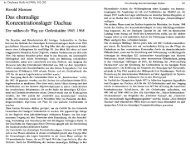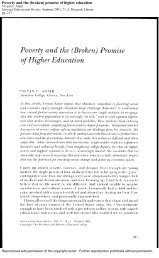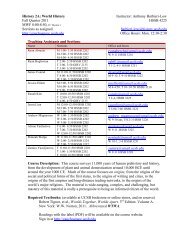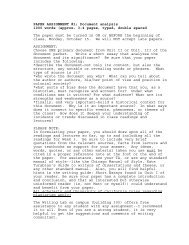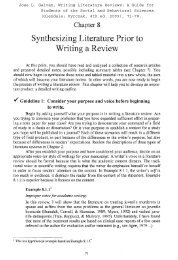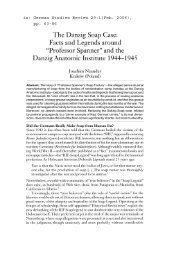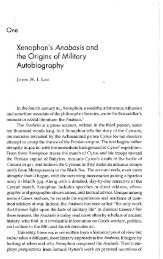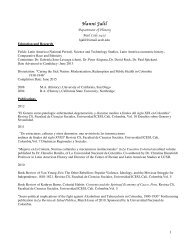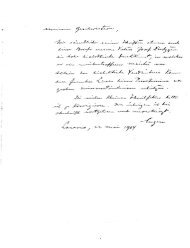DISASTER IN DARFUR - UCSB Department of History - University of ...
DISASTER IN DARFUR - UCSB Department of History - University of ...
DISASTER IN DARFUR - UCSB Department of History - University of ...
You also want an ePaper? Increase the reach of your titles
YUMPU automatically turns print PDFs into web optimized ePapers that Google loves.
4<br />
fifty years <strong>of</strong> British rule became a sophisticated if not worldly ruling class that<br />
reinforced the disdain and derision <strong>of</strong> their grandfathers and fathers for the rustic illiterate<br />
folk from the West, East, and South. It was among these simple farmers and coarse<br />
herdsmen in the western Sudan <strong>of</strong> Kord<strong>of</strong>an and Darfur that the Umma Party <strong>of</strong> Sayyid<br />
Abd al-Rahman could count on support from his fervent followers, for his father,<br />
Muhammad Ahmad ibn Abdallah, the Mahdi, had recruited among the Baqqara and Fur<br />
the shock troops for his army that destroyed Egyptian rule in the Sudan and established<br />
the Mahdist State. They have remained passionately loyal to Mahdism, and after the<br />
independence <strong>of</strong> the Sudan in 1956 the Umma began to introduce selected sons <strong>of</strong> the old<br />
Darfur elite into the political life <strong>of</strong> Omdurman and Khartoum. Here they became<br />
assimilated into the ruling riverain awlad al-bahar or in the contemptuous words <strong>of</strong> the<br />
Darfurian political activist, Dr. Sharif Harir, they were corrupted by “riverization” after<br />
abandoning their traditional roots in Darfur for the political highlife <strong>of</strong> Khartoum.<br />
The ethnic and cultural discrimination by the riverain ruling elite in Khartoum for<br />
those Sudanese living on the periphery has historically established the pattern <strong>of</strong><br />
governance by the awlad al-bahar, which constitutes a circumference <strong>of</strong> no more than a<br />
few hundred miles from the confluence <strong>of</strong> the two Niles, and those lands beyond where<br />
the authority diminishes with the distance from the heartland. At no time in the last two<br />
hundred years has the central government <strong>of</strong> the Sudan—neither nineteenth century<br />
Turks or twentieth century British and certainly not the independent Sudanese—actually<br />
governed Darfur, the southern Sudan, or even the Red Sea Hills. Officials from the<br />
central government occupied the periphery with scattered symbolic posts in the<br />
countryside and a garrison and governor in the traditional capital, but at no time have





